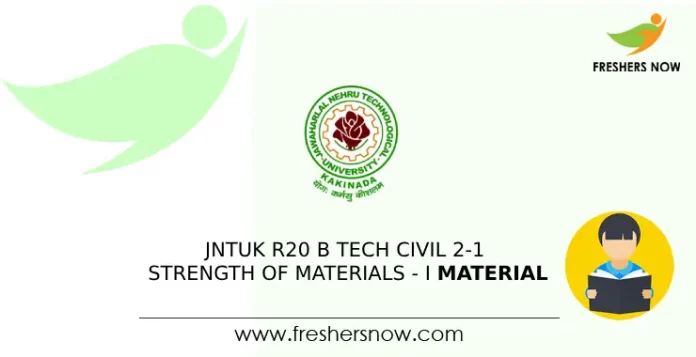
JNTUK R20 B Tech Civil 2-1 Strength of Materials – I Material/ Notes PDF Download: For students pursuing their B.Tech in Civil Engineering under the JNTUK R20 curriculum, the study material for Strength of Materials – I is crucial. This material aims to lay down the foundational concepts of the Strength of Materials and the Principles of Elasticity and Plasticity Stress conditions. Through this course, students will learn to develop diagrams illustrating the variation of various stresses along the length of a material. Download the PDF material to enrich your understanding and excel in your academics.
JNTUK R20 B Tech Civil 2-1 Strength of Materials – I Material – Units
| No. Of Units | Name of the Unit |
| Unit – 1 | Simple Stresses And Strains |
| Unit – 2 | Shear Force and Bending Moment |
| Unit – 3 | Flexural and shear Stresses in beams |
| Unit – 4 | Deflection of Beams |
| Unit – 5 | Thin and Thick Cylinders |
Unit 1 Syllabus PDF Download | JNTUK R20 B Tech Civil 2-1 Strength of Materials – I Material
Simple Stresses And Strains: Elasticity and plasticity – Types of stresses and strains – Hooke’s law – stress–strain diagram for mild steel – Working stress – Factor of safety – Lateral strain, Poisson’s ratio, and volumetric strain – Elastic moduli and the relationship between them – Bars of varying section – stresses in composite bars – Temperature stresses.
| JNTUK R20 B Tech Strength of Materials – I Material – PDF Download | |
| To Download JNTUK R20 B Tech Civil Strength of Materials – I Material Unit – 1 PDF | Download PDF |
Unit 2 Syllabus PDF Download | JNTUK R20 B Tech Civil 2-1 Strength of Materials – I Material
Shear Force and Bending Moment: Definition of beam – Types of beams – Concept of shear force and bending moment – Point of contra flexure – Relation between S.F., B.M and rate of loading at a section of a beam; S.F and B.M diagrams for cantilever, simply supported and overhanging beams subjected to point loads, uniformly distributed loads, uniformly varying loads, partial uniformly distributed loads, couple and combination of these loads.
| JNTUK R20 B Tech Strength of Materials – I Material – PDF Download | |
| To Download JNTUK R20 B Tech Civil Strength of Materials – I Material Unit – 2 PDF | Download PDF |
Unit 3 Syllabus PDF Download | JNTUK R20 B Tech Civil 2-1 Strength of Materials – I Material
Flexural and shear Stresses in beams
Flexural Stresses: Theory of simple bending – Assumptions – Derivation of bending equation: M/I = f/y = E/R, Neutral axis – Determination bending stresses – section modulus of rectangular and circular sections (Solid and Hollow), I, T, Angle and Channel sections – Design of simple beam sections.
Shear Stresses: Derivation of formula – Shear stress distribution across various beam sections like rectangular, circular, I, and T Angle sections.
| JNTUK R20 B Tech Strength of Materials – I Material – PDF Download | |
| To Download JNTUK R20 B Tech Civil Strength of Materials – I Material Unit – 3 PDF | Download PDF |
Unit 4 Syllabus PDF Download | JNTUK R20 B Tech Civil 2-1 Strength of Materials – I Material
Deflection of Beams: Bending into a circular arc – slope, deflection, and radius of curvature – Differential equation for the elastic curve of a beam – Double integration and Macaulay’s methods – Determination of slope and deflection for cantilever, simply supported and overhanging beams subjected to point loads, uniformly distributed loads, uniformly varying loads, partial uniformly distributed loads, couple and combination of these loads. Mohr’s theorems – Moment area method – application to simple cases of a cantilever.
| JNTUK R20 B Tech Strength of Materials – I Material – PDF Download | |
| To Download JNTUK R20 B Tech Civil Strength of Materials – I Material Unit – 4 PDF | Download PDF |
Unit 5 Syllabus PDF Download | JNTUK R20 B Tech Civil 2-1 Strength of Materials – I Material
Thin and Thick Cylinders: Thin cylindrical shells – Derivation of formula for longitudinal and circumferential stresses – hoop, longitudinal, and volumetric strains – changes in diameter, and volume of thin cylinders.
Thick cylinders: Introduction: Lame’s theory for thick cylinders, Derivation of Lame’s formulae, distribution of hoop and radial stresses across the thickness, compound cylinders-distribution of stresses.
| JNTUK R20 B Tech Strength of Materials – I Material – PDF Download | |
| To Download JNTUK R20 B Tech Civil Strength of Materials – I Material Unit – 5 PDF | Download PDF |
For more details about Material and other materials follow our official website Freshersnow.com.
| You Can Also Check | |
| JNTUK R20 B Tech Civil 2-1 Mathematics – III Material | |
| JNTUK R20 B Tech Civil 2-1 Fluid Mechanics Material | |
| JNTUK R20 B Tech Civil 2-1 Surveying and Geometrics Material | |
JNTUK R20 B Tech Civil Strength of Materials – I Notes – Outcomes
- Gain an understanding of basic material behavior under diverse external loading and support conditions.
- Demonstrate the ability to create diagrams depicting variations in key performance parameters like bending moment and forces.
- Acquire knowledge of bending concepts, including calculation of section modulus, determination of stresses in beams, and prediction of deflections under various loading conditions.
- Evaluate stresses across sections of thin and thick cylinders, utilizing Lame’s equation to identify optimal sections capable of withstanding internal pressure.



